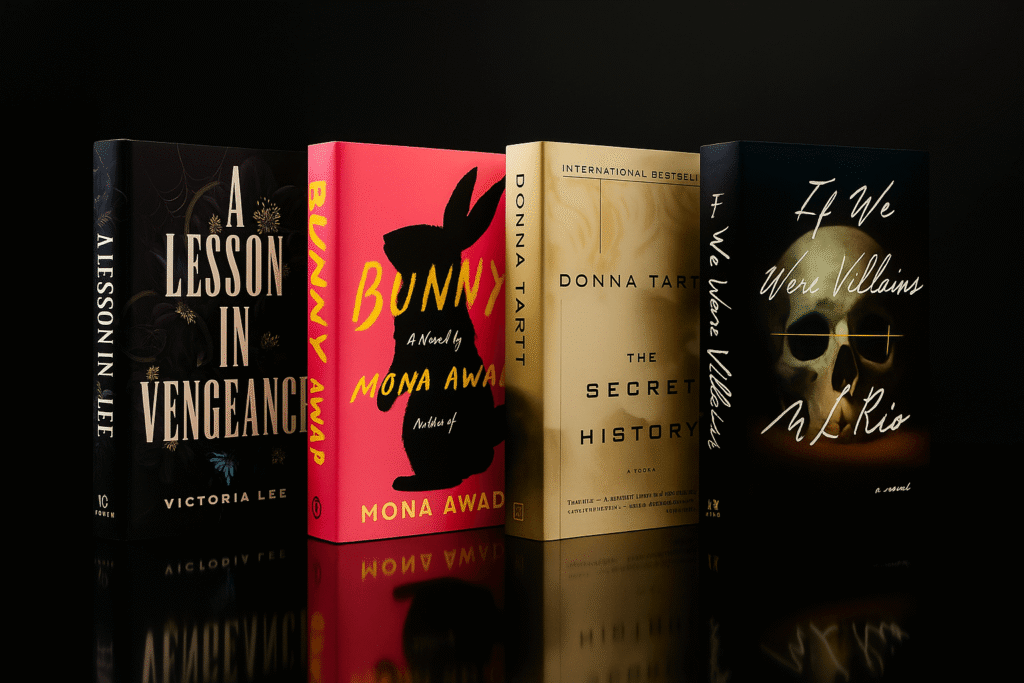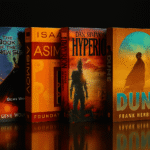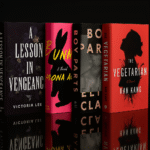Table of Contents
The Allure of If We Were Villains
If We Were Villains by M.L. Rio has captivated readers with its haunting blend of Shakespearean drama, dark academia, and tragic friendships. Set within the elite walls of the Dellecher Classical Conservatory, the novel unravels a murder mystery among a tight-knit group of theater students obsessed with performance and identity.
What makes this novel unforgettable is its literary richness, morally gray characters, and unreliable narrator—elements that create a unique emotional intensity. If you’re searching for books like If We Were Villains, chances are you’re craving more twisted intellectual drama, lyrical writing, and slow-burning suspense set in academic or artistic environments.
Whether you were drawn in by the theatrical references, the unraveling psychological tension, or the devastating ending, you’re in for a treat. This curated list dives into books similar to If We Were Villains that echo its themes of obsession, performance, betrayal, and intellectual darkness.
Other Works by M.L. Rio
Interestingly, If We Were Villains is M.L. Rio’s debut and, so far, her only published novel. However, she has hinted at future projects rooted in the same literary and academic universe. Fans hungry for more can follow her updates on her official site or her Twitter.
In the meantime, she has contributed to various literary essays and discussions on dark academia, offering a rich trove of insights for fans. Many readers seeking books like If We Were Villains find solace in diving deeper into Rio’s literary influences, particularly Shakespearean tragedies and character-driven storytelling.
The Life and Style of M.L. Rio
M.L. Rio studied English and Shakespeare at King’s College London and pursued graduate studies in Shakespearean literature. Her academic background shines through in If We Were Villains, where Shakespeare’s plays serve not just as props but as thematic foreshadowing.
Rio has mentioned in interviews that her love for theater, combined with her fascination for obsession and tragedy, shaped the novel’s tone. She identifies herself as a “recovering theater kid,” and her writing style reflects a deep understanding of performance both on and off the stage. That immersive approach is why books like If We Were Villains often draw on classical literature, performative identities, and elite educational settings.
Fun Facts & Stats About If We Were Villains
- Published: April 11, 2017 by Flatiron Books
- Sales: Estimated over 1 million copies worldwide, with a steady increase due to the rise of the #darkacademia trend on TikTok and Instagram.
- Languages: Translated into 15+ languages, including Japanese, French, and Portuguese
- Goodreads Rating: 4.24 ★ from over 400,000 ratings
- Adaptation News: There’s ongoing talk of a limited series adaptation, with Rio involved as a consultant.
The book’s cult following has placed it alongside titles like The Secret History, and it’s now a staple for fans of moody, academic fiction. Readers frequently search for books similar to If We Were Villains to satisfy their craving for the dark, literary aesthetic.
Literary Inspirations Behind If We Were Villains
At its core, If We Were Villains is inspired by Shakespearean tragedies—particularly King Lear, Macbeth, and Julius Caesar. It also draws thematic parallels with Donna Tartt’s The Secret History and the concept of the “tragedy of genius.”
The book fits snugly within the dark academia genre, alongside works like Dead Poets Society and Black Swan (film), where the pursuit of excellence descends into obsession and collapse.
Books like If We Were Villains: Our Top Recommendations
1. The Secret History by Donna Tartt
Description:
Set at a small elite college in Vermont, this novel follows a group of classics students who murder one of their own. Told retrospectively, it dives deep into themes of morality, aesthetics, and intellectual elitism.
Why it’s similar:
Both books explore tight-knit academic cliques, intellectual obsession, and moral ambiguity. Tartt’s prose, like Rio’s, is richly descriptive and introspective.
Random facts:
- Won the 1992 WH Smith Literary Award
- Still sells over 100,000 copies annually
- Often called the origin of dark academia fiction
Quote:
“For if the modern mind is whimsical and discursive, the classical mind is narrow, unhesitating, relentless.”
👉 Read more on Penguin Random House
2. Bunny by Mona Awad
Description:
At a prestigious MFA program, outsider Samantha is invited into a mysterious clique of women who blur the lines between fiction and reality. Surreal and sinister, the novel twists literary ambition into madness.
Why it’s similar:
Blends academic satire with surreal horror and performance, creating a similar eerie atmosphere. Both novels critique creative institutions through a psychological lens.
Random facts:
- Shortlisted for the 2020 Goodreads Choice Awards
- Mona Awad studied at Brown University, the inspiration for the novel
- Optioned for a film adaptation
Quote:
“They called each other Bunny and watched me like I was something in a jar.”
3. A Lesson in Vengeance by Victoria Lee
Description:
Set in a haunted boarding school with a history of witchcraft, this story follows Felicity and a famous young writer, Ellis, as they delve into sinister mysteries for the sake of “research.”
Why it’s similar:
Both explore the dark side of literary ambition, emotional manipulation, and blurred lines between fiction and reality in elite schools.
Random facts:
- Finalist for the 2022 Lambda Literary Award
- Praised for queer representation
- Inspired by The Secret History and If We Were Villains
Quote:
“We’re all just stories in the end, aren’t we?”
4. Plain Bad Heroines by Emily M. Danforth
Description:
An ambitious novel with dual timelines—one set at a cursed girls’ school in 1902, the other in the present as a film adaptation unfolds. Sapphic, gothic, and meta.
Why it’s similar:
Examines performance, queerness, and academic legacies, making it a natural follow-up for fans of Rio’s layered storytelling.
Random facts:
- Over 600 pages long, filled with illustrations
- Listed in NPR’s Best Books of the Year
- TikTok popularized it as “#gaygothic”
Quote:
“To love a ghost is to wait forever.”
5. Black Chalk by Christopher J. Yates
Description:
Six Oxford students invent a game of psychological dares—but the stakes grow deadly. Told through alternating timelines with a cryptic narrator.
Why it’s similar:
Intellectual games gone too far, unreliable narration, and a growing sense of dread—all core themes in If We Were Villains.
Random facts:
- Won the Alex Award in 2015
- Inspired by real Oxford societies
- Compared to The Secret History in tone and plot
Quote:
“The game didn’t change us. It just revealed who we really were.”
6. They Never Learn by Layne Fargo
Description:
A female professor turns vigilante, targeting abusive men on campus. Dual perspectives create a fast-paced, morally charged narrative.
Why it’s similar:
Though more thriller than literary, it explores justice, academia, and complex morality, resonating with readers looking for dark, cerebral fiction.
Random facts:
- Queer rep and feminist themes
- Popular in true-crime fiction circles
- Being adapted into a series
Quote:
“You can only be invisible if no one’s paying attention. I make them pay attention.”
7. The Atlas Six by Olivie Blake
Description:
Six talented magicians are chosen to join a secret society within the Alexandrian Library. Only five will survive. A dark academia fantasy full of scheming and seduction.
Why it’s similar:
While fantastical, it shares the high-stakes intellectual competition and found-family-turned-enemy tension seen in Rio’s novel.
Random facts:
- Originally self-published on TikTok
- Signed by Tor for a trilogy deal
- Blurs the line between fantasy and academia
Quote:
“Knowledge is carnage. You can’t have it without sacrifice.”

Comparative Table: If We Were Villains vs Recommended Reads
| Book Title | Setting | Themes | Narrative Style | Similarity Score |
|---|---|---|---|---|
| If We Were Villains | Drama School | Shakespeare, Tragedy, Performance | First-person, flashback | — |
| The Secret History | College (Vermont) | Elitism, Morality, Aesthetics | First-person retrospective | ★★★★★ |
| Bunny | MFA Program | Surrealism, Alienation, Creation | Unreliable narrator | ★★★★☆ |
| A Lesson in Vengeance | Boarding School | Queerness, Witchcraft, Guilt | Lyrical, Dual Characters | ★★★★☆ |
| Plain Bad Heroines | Girls’ School/Film Set | Legacy, Horror, LGBTQ+ | Dual timeline, meta | ★★★★☆ |
| Black Chalk | Oxford University | Games, Guilt, Identity | Puzzle-like, moody | ★★★★☆ |
| They Never Learn | University | Feminist Revenge, Power | Thriller-paced | ★★★☆☆ |
| The Atlas Six | Secret Library | Knowledge, Power, Betrayal | Multi-POV, philosophical | ★★★☆☆ |
FAQs about books like If We Were Villains
What genre is If We Were Villains?
It falls under dark academia, psychological fiction, and literary mystery.
Is If We Were Villains based on a true story?
No, it’s a fictional story inspired by Shakespearean themes and academic settings.
Will there be a sequel to If We Were Villains?
As of now, M.L. Rio has no confirmed plans for a sequel but has teased future dark academia projects.
Is If We Were Villains suitable for young readers?
It’s best suited for older teens and adults due to mature themes, violence, and complex emotional content.
Why do people compare If We Were Villains to The Secret History?
Both involve elite academic groups, morally ambiguous characters, and a central tragedy that haunts the story.
Where can I find books like If We Were Villains?
You can explore curated lists on Goodreads, BookTok, and literary blogs like My Plot Review.

